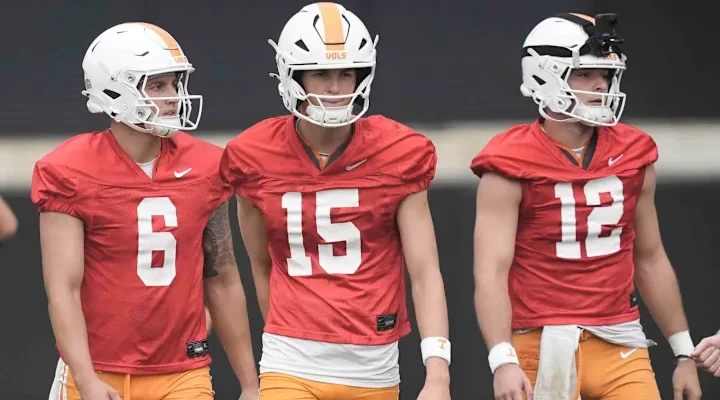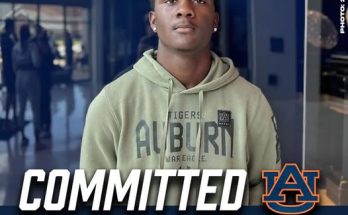When Tennessee head coach Josh Heupel finally made the announcement that Joey Aguilar would be the starting quarterback for the Volunteers, it marked the end of months of speculation, competition, and quiet tension within the program. The quarterback position at Tennessee has always carried a unique weight, not just because of the expectations of SEC football, but because of the passionate fan base, the program’s history, and the constant comparisons to past greats. For Heupel, who himself played the position at the highest level in college and knows intimately the mental and physical challenges that come with it, this decision was never going to be one made lightly. The Vols had multiple capable arms in the quarterback room, all of whom had been battling through spring practices, summer workouts, and fall camp with the belief that the job could be theirs. Yet, when Heupel chose Aguilar, it wasn’t just about naming a starter—it was about setting the tone for the entire season, and the message he delivered to his quarterbacks after that choice reflected not only his vision for the team but also his philosophy on leadership and competition.
According to those who were close to the decision, Heupel gathered his quarterbacks shortly before the news broke publicly. For a coach, this is one of the most delicate moments in any season: you have to lift up the player you’re entrusting with the keys to the offense, but you also need to support the others who will be asked to remain locked in, prepared, and ready at a moment’s notice. In today’s era of college football, where the transfer portal looms large and players can be quick to look elsewhere for opportunities, the way a coach handles this conversation often determines the culture of the locker room. Heupel, by all accounts, made it clear that while Joey Aguilar had earned the starting job, the work and the contributions of the others were not diminished or forgotten. He told them that the quarterback position is unique in that it magnifies every decision, every throw, every mistake, but also that it takes an entire room to sustain success across a season. Injuries happen, momentum shifts, and no season ever plays out exactly as expected. Heupel reminded them that even if you’re not the starter today, you might be asked to step in tomorrow, and when that time comes, the team cannot afford hesitation or lack of preparation.
What struck many about Heupel’s message was the balance of honesty and encouragement. To Aguilar, the message was simple: you earned this. You’ve prepared, you’ve competed, and you’ve shown the consistency we need at the most important position on the field. But earning the job is just the beginning, not the end. Heupel, who has coached quarterbacks at every level, understands that the pressure actually increases once you’re the starter. Every defensive coordinator in the SEC will study your tendencies, your mechanics, your weaknesses, and they’ll design schemes specifically to test you. For Aguilar, that meant he had to remain locked into his preparation, to keep growing, and to understand that leadership is about more than completing passes—it’s about inspiring trust in the huddle, keeping poise in difficult moments, and setting the standard for everyone else.
To the quarterbacks who weren’t chosen, Heupel’s message was equally important. He told them that their value to the team is not diminished because they weren’t named the starter. The quarterbacks who push the starter in practice, who challenge the defense during scout reps, and who keep themselves ready at all times are often the unsung backbone of a successful season. Heupel reminded them that football is unpredictable. One injury, one off game, one sudden change in momentum, and the next man up has to be ready without hesitation. He emphasized that this is not about dividing the room into starter and backups, but about cultivating a collective unit where everyone feels ownership in the offense’s success.
Heupel’s background as a former quarterback makes him especially effective in these moments. He knows firsthand what it feels like to battle for a job, to win it, and to lose it. At Oklahoma, he had to fight his way into a starting role, and his own journey was never guaranteed. That perspective allows him to speak with authenticity to his players, to reassure the ones who may be disappointed, and to ground the one who has been elevated in reality. Heupel is acutely aware that quarterbacks are natural competitors; they don’t want to sit, they don’t want to wait, and they certainly don’t want to feel forgotten. His message sought to prevent any sense of division, instead reinforcing that while Aguilar was the starter, Tennessee’s quarterback room had to remain unified if the Volunteers wanted to reach their goals this season.
The timing of the decision was also strategic. Coaches often debate whether to name a starter early in camp, giving the offense stability and clarity, or to let the competition drag on to push players to the very end. Heupel chose a moment when the players still had time to adjust mentally before the first big game, giving Aguilar time to step into his leadership role fully, while also allowing the other quarterbacks to reframe their mindsets without the sting of the decision lingering too close to opening kickoff. In his talk with the quarterbacks, he stressed that the announcement wasn’t about closing doors, but about opening one wide. Aguilar would need every ounce of support from his teammates, not just the offensive line and receivers, but from the very men who were competing against him. It’s a delicate balance—asking competitors to shift into supporters—but it’s a dynamic that championship-level teams manage to pull off.
For Aguilar, the challenge now is meeting the standard Heupel set. Tennessee’s offense under Heupel has been known for its tempo, explosiveness, and creativity. Quarterbacks are asked to process quickly, deliver decisively, and remain aggressive. Heupel’s system puts immense responsibility on the quarterback to not just execute plays but to manage the rhythm of the game itself. That means Aguilar will be tested not only physically but mentally. Heupel’s talk with him underscored that the margin for error in the SEC is razor-thin. Defenses are fast, opportunistic, and relentless. Mistakes will happen, but how quickly a quarterback recovers, how he responds to adversity, and how he maintains command of the offense in difficult moments will define his season.
The quarterbacks who weren’t chosen have their own decisions to make. In the modern era, with the transfer portal and NIL opportunities, it’s not uncommon for players to move on after losing out on a starting job. Heupel’s message was an effort to keep that temptation at bay by reinforcing their importance to the team. He told them that loyalty, patience, and preparation are often rewarded in ways that aren’t immediately visible. Sometimes it’s a midseason injury that opens the door. Sometimes it’s a late-game moment that requires a steady hand off the bench. And sometimes, it’s simply the knowledge that your efforts in practice helped sharpen the very player who is representing the program on Saturdays.
Heupel also spoke about identity—not just of the quarterback, but of the team. He said the quarterback room is a reflection of the program’s culture. If the quarterbacks are divided, the team will feel it. If they are unified, if they genuinely support one another, the team will feed off that energy. Tennessee’s ambitions this season are not small. The Volunteers want to compete for the SEC East, they want to be in the national conversation, and they want to build on the momentum Heupel has created since arriving in Knoxville. That requires not just talent, but unity, and in his message, Heupel made it clear that this decision was about more than one player—it was about setting the tone for the program’s pursuit of greatness.
Even in the days after the decision, Heupel continued to emphasize this point in his public comments. He praised Aguilar for his poise, his preparation, and his ability to win the trust of his teammates. At the same time, he made a point to publicly acknowledge the efforts of the other quarterbacks, noting how competitive the battle had been and how impressed he was by their resilience. This dual approach is crucial because it ensures that the narrative outside the program does not create unnecessary rifts inside it. Fans and media may debate who should have started, but inside the building, Heupel’s message was that Tennessee had one starting quarterback but multiple leaders, and each one had a role to play in the journey ahead.
Ultimately, what Josh Heupel told Tennessee’s quarterbacks after naming Joey Aguilar the starter was about more than a single decision. It was about shaping a culture of accountability, resilience, and unity. It was about teaching young men that football is unpredictable, that preparation is non-negotiable, and that personal disappointment does not erase collective responsibility. For Aguilar, it was the beginning of a new chapter, one where the weight of Tennessee’s hopes now rests on his shoulders. For the others, it was a reminder that their time could still come, that their contributions matter, and that in the game of football, the line between starter and backup is thinner than it often appears.
In the end, Heupel’s words reflected the reality of leadership in college football. A team is only as strong as its belief in one another, and a quarterback room is only as effective as its unity. By delivering his message with honesty, empathy, and conviction, Heupel ensured that Tennessee entered the season not with division, but with clarity of purpose. And in the unforgiving grind of the SEC, that clarity might be the very thing that allows the Volunteers to weather storms and seize opportunities as they chase their goals this fall.



